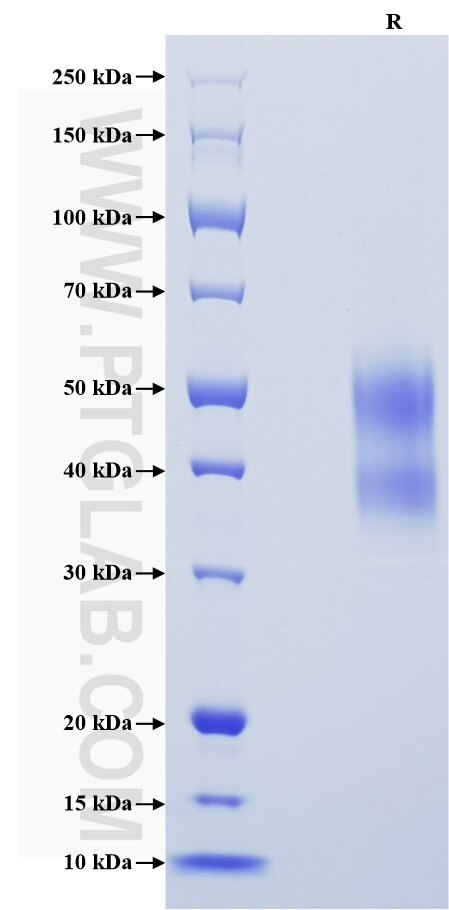Recombinant Human VISTA/C10orf54 protein (Myc Tag, His Tag)
Species
Human
Purity
>90 %, SDS-PAGE
Tag
Myc Tag, His Tag
Activity
not tested
Cat no : Eg0017
Validation Data Gallery
Product Information
| Purity | >90 %, SDS-PAGE |
| Endotoxin | <0.1 EU/μg protein, LAL method |
| Activity |
Not tested |
| Expression | HEK293-derived Human VISTA protein Phe33-Ala194 (Accession# Q9H7M9, D187E ) with a Myc tag and a His tag at the C-terminus. |
| GeneID | 64115 |
| Accession | Q9H7M9 |
| PredictedSize | 23.7 kDa |
| SDS-PAGE | 35-55 kDa, reducing (R) conditions |
| Formulation | Lyophilized from 0.22 μm filtered solution in PBS, pH 7.4. Normally 5% trehalose and 5% mannitol are added as protectants before lyophilization. |
| Reconstitution | Briefly centrifuge the tube before opening. Reconstitute at 0.1-0.5 mg/mL in sterile water. |
| Storage Conditions |
It is recommended that the protein be aliquoted for optimal storage. Avoid repeated freeze-thaw cycles.
|
| Shipping | The product is shipped at ambient temperature. Upon receipt, store it immediately at the recommended temperature. |
Background
VISTA (V-domain Ig suppressor of T cell activation), also known as C10orf54, B7-H5, PD-1H and Dies1, is a member of the immune checkpoints of the B7 family that shares significant homology with PD-L1 and PD-L2. VISTA is predominantly expressed on haematopoietic cells, myeloid cells, and weakly expressed on T cells. It can act as a ligand expressed on antigen presenting cells (APCs), and also functions as an coinhibitory receptor for CD4+ T cells. VISTA exerts negative regulatory functions by suppressing the activation, proliferation, and cytokine secretion of T cells. VISTA plays an important role in tumor progression and immune escape and can be used as a predictor for diagnosis or immunotherapy of cancer.
References:
1.Yuan, Long et al. Trends in immunology vol. 42,3 (2021): 209-227. 2.Mulati, Kumuluzi et al. British journal of cancer vol. 120,1 (2019): 115-127. 3.Shi, Tongguo et al. Journal of immunology research vol. 2022, (2022): 3013185. 4.Emaldi, Maite et al. iScience vol. 27,9 (2024): 110587.

